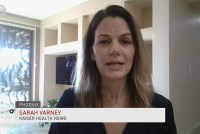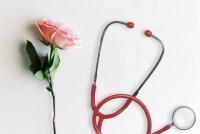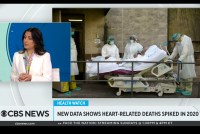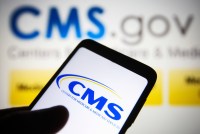Latest KFF Health News Stories
Judge Signals He Could Rule to Halt Sales of Common Abortion Pill
A U.S. District Court case is being widely followed because the judge’s decision could overturn the FDA’s approval of mifepristone two decades ago. With abortion rights polling well even in red states, anti-abortion activists are increasingly turning to the courts to achieve their aims.
What the Health? From KFF Health News: Judging the Abortion Pill
Any day now a conservative federal judge in Texas could upend the national abortion debate by requiring the FDA to rescind its approval of mifepristone, a drug approved in the U.S. more than 20 years ago that is now used in more than half of abortions nationwide. Meanwhile, a controversial study on masks gets a clarification, although it may be too late to change the public impression of what it found. Alice Miranda Ollstein of Politico, Jessie Hellmann of CQ Roll Call, and Sarah Karlin-Smith of the Pink Sheet join KHN chief Washington correspondent Julie Rovner to discuss these issues and more. Plus, for “extra credit,” the panelists suggest health policy stories they read this week they think you should read, too.
An Arm and a Leg: Wrestling With a Giant: How to Dispute a Hospital Bill
One listener tried to dispute a $1,300 “facility fee” with the treating hospital, his insurer, a bill-mediation service provided by his employer, and finally a debt collector. He didn’t win, but he learned valuable lessons about advocating for hospital discounts.
What the Health? From KFF Health News: Biden Budget Touches All the Bases
Very little in the proposed budget released by the Biden administration is likely to become law, particularly with Republicans in charge of the U.S. House. Still, the document is an important statement of the president’s policy priorities, and it’s clear health programs are among those he feels are important. Meanwhile, five women who were denied abortions when their pregnancies threatened their lives are suing Texas. Shefali Luthra of The 19th, Victoria Knight of Axios, and Margot Sanger-Katz of The New York Times join KHN’s Julie Rovner to discuss these issues and more. Also this week, Rovner interviews Harris Meyer, who reported and wrote the two latest KHN-NPR “Bill of the Month” features. Both were about families facing unexpected bills following childbirth.
Girls in Texas Could Get Birth Control at Federal Clinics, Until a Christian Father Objected
A Donald Trump-appointed federal judge agreed that even the possibility that the father’s daughters might access contraception without his permission violated the tenants of his Christian faith.
Watch: Emergency Room Turns Simple Injury Into a Big Bill
This installment of InvestigateTV and KHN’s “Costly Care” series looks at the case of a New Orleans woman whose thumb injury saddled her with a big ER bill for a tetanus shot and some minor care.
Watch: Walgreens Won’t Sell Abortion Pill in 21 States Under GOP Threat of Legal Action
Under pressure from Republican attorneys general, the nation’s second-largest pharmacy chain says it will not dispense the abortion pill mifepristone.
What the Health? From KFF Health News: March Medicaid Madness
President Joe Biden and Republicans in Congress spent last month sparring over whether to shield Medicare and Social Security from budget cuts — leading some to wonder if Medicaid was on the table instead. Biden and Democrats say no, but some Republicans seem eager to trim federal spending on the health program for Americans with low incomes. And ready or not, artificial intelligence is coming to medical care. Benefits, as well as unintended consequences, are likely. Alice Miranda Ollstein of Politico, Rachel Cohrs of STAT News, and Lauren Weber of The Washington Post join KHN’s chief Washington correspondent, Julie Rovner, to discuss these issues and more.
One Texas Judge Will Decide Fate of Abortion Pill Used by Millions of American Women
“What happens in Texas doesn’t stay in Texas,” warns an abortion rights advocate bracing for a district judge’s ruling on whether the abortion pill mifepristone was properly authorized by the FDA. His decision could force the medication off the U.S. market.
What the Health? From KFF Health News: Senators Have Mental Health Crises, Too
When U.S. Sen. John Fetterman of Pennsylvania checked himself into the Walter Reed National Military Medical Center for treatment of depression this month, he got an unusual reaction from his colleagues in Congress: compassion. It’s a far cry from how politicians once kept their mental health issues under wraps at all costs. Meanwhile, GOP presidential candidate Nikki Haley is stirring up controversy by proposing that all politicians over age 75 be required to pass a mental competency test to hold office. Joanne Kenen of the Johns Hopkins Bloomberg School of Public Health and Politico, Sarah Karlin-Smith of the Pink Sheet, and Rachel Roubein of The Washington Post join KHN chief Washington correspondent Julie Rovner to discuss these issues and more. Plus, for “extra credit,” the panelists suggest health policy stories they read this week that they think you should read, too.
What the Health? From KFF Health News: The Kids Are Not OK
A new survey from the Centers for Disease Control and Prevention finds that teenagers, particularly girls, are reporting all-time high rates of violence and profound mental distress. Meanwhile, both sides in the abortion debate are anxiously waiting for a district court decision in Texas that could effectively revoke the FDA’s 22-year-old approval of the abortion pill mifepristone. Alice Miranda Ollstein of Politico, Sandhya Raman of CQ Roll Call, and Joanne Kenen of the Johns Hopkins Bloomberg School of Public Health and Politico join KHN’s chief Washington correspondent, Julie Rovner, to discuss these issues and more.
An Arm and a Leg: She Sued a Hospital and Lost — But Felt She’d Won
A listener sued a hospital in small-claims court and lost but felt as if she’d won. Now, she wants to encourage more people to take their bills to court.
Watch: In Insurers’ Eyes, Not All Midwives Are Equal
The first installment of InvestigateTV and KHN’s “Costly Care” series explores one California mother’s experience struggling to get reimbursed for midwifery care and the differences between providers that may determine whether insurance covers them.
Special Delivery: Heart-Heavy Health Policy Valentines
KHN shares the cream of the crop of creative valentines about health policy submitted by readers and tweeters. Our favorite is anointed with an original illustration and bragging rights as “the one.”
What the Health? From KFF Health News: A Health-Heavy State of the Union
President Joe Biden’s 2023 State of the Union address leaned heavily on health care issues. Biden took a victory lap for recent accomplishments like capping prescription drug costs for seniors on Medicare. He also urged Congress to make permanent the boosted premium subsidies under the Affordable Care Act, and he sparred with Republicans on threats to cut Social Security and Medicare. Also this week, both sides in the abortion debate are bracing for a court decision out of Texas that could, at least temporarily, make the abortion pill mifepristone illegal nationwide. Alice Miranda Ollstein of Politico, Rachel Cohrs of Stat, and Sarah Karlin-Smith of the Pink Sheet join KHN chief Washington correspondent Julie Rovner to discuss these issues and more. Also this week, Rovner interviews Kate Baicker of the University of Chicago about a possible middle ground in the effort to get universal health insurance coverage.
What the Health? From KFF Health News: Au Revoir, Public Health Emergency
The Biden administration this week announced it would let the covid-19 public health emergency lapse on May 11, even as the Republican-led House was voting to immediately eliminate the special authorities of the so-called PHE. Meanwhile, anti-abortion forces are pressuring legislators to both tighten abortion restrictions and pay for every birth in the nation. Margot Sanger-Katz of The New York Times, Rachel Roubein of The Washington Post, and Victoria Knight of Axios join KHN’s chief Washington correspondent Julie Rovner to discuss these issues and more. Also this week, Rovner interviews Hannah Wesolowski of the National Alliance on Mental Illness about the rollout of the national 988 suicide prevention hotline.
Watch: Covid Increases Risk of Heart Problems, New Data Underlines
Céline Gounder, KHN editor-at-large for public health, discusses new data showing an excess of deaths in 2020 related to heart disease.
An Arm and a Leg: Can They Freaking Do That?!? (2023 Update)
Can a medical provider you’ve never heard of send you an outrageous bill? Sure. Can you fight back and win? Yes, sometimes you can. Here’s how to do it.
In Part II of this special two-part episode, Alice Miranda Ollstein of Politico, Sandhya Raman of CQ Roll Call, and Sarah Varney of KHN join KHN chief Washington correspondent Julie Rovner to discuss how the abortion debate has evolved since the Supreme Court overturned the nationwide right to abortion in 2022, and what might be the flashpoints for 2023. Also, for extra credit, the panelists recommend their most memorable reproductive health stories from the last year.
Did Your Health Plan Rip Off Medicare?
KHN has released never-before-seen details of federal audits as the government weighs action against dozens of Medicare Advantage plans.

















